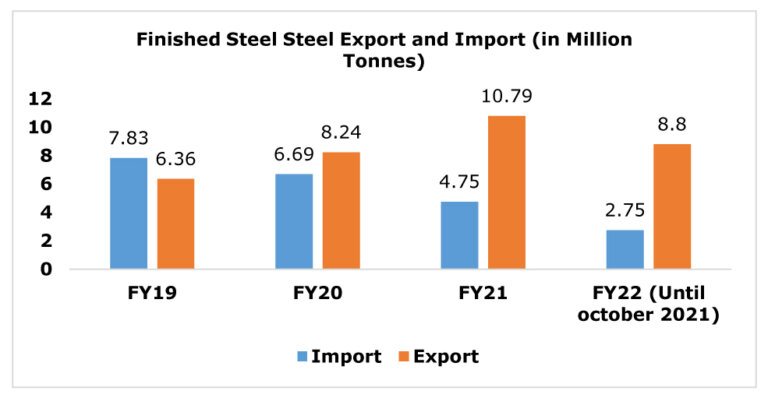
Since 2013 India’s steel industry has witnessed substantial growth, with production surging by 75% since 2008, accompanied by an almost 80% rise in domestic steel demand.
Industrialization progressed and thrived due to the availability of metals. Steel occupied the top spot among 11 key infrastructure sectors. It serves major of economic development because it is a raw material, an intermediary product and end product as well.
Global Ranking of Indian Steel: China maintained its position as the world’s leading crude steel producer, contributing to 75% of the Asia and Oceania region’s output and 53% of the global crude steel production during 2021-2022. India, on the other hand, ranked as the second-largest crude steel producer and experienced a notable production growth of 17.8%.
Defense Production: The range of manufactured products encompasses arms and ammunition, tanks, heavy vehicles, fighter aircraft, electronic equipment, earthmoving machinery, special alloys, and specialized purpose steels.
Seamless Steel Pipes, Tubes and Steel Pipes: The extensive size range renders them suitable for various versatile applications. Approximately 60% of the total demand for seamless pipes comes from the oil sector, while the bearing and boiler sectors contribute to about 30% of the demand.
Commercial and Residential Construction: It is anticipated that approximately 158 lakh metric tonnes (MT) of steel will be required for the construction of houses approved under the Pradhan Mantri Awas Yojana (Urban).
Low-Cost Mass Housing: In order to encourage the utilization of steel in affordable housing, in prefab constructions, the Ministry is actively working on revising the BIS codes related to the design of prefab steel structures.
Automotive sector, Roads, Tower Fabrication, Bridges etc. are other sector where steel is into the demand.
Further promote the use of steel in cost-effective housing, particularly in prefabricated structures, the Ministry is proactively engaged in revising the Bureau of Indian Standards (BIS) codes that pertain to the design of prefab steel constructions.
The 2017 National Steel Policy (NSP) aims to boost India’s steel industry, driving economic growth and global competitiveness. Tata Steel recently achieved a groundbreaking milestone by injecting 40% hydrogen gas into its ‘E’ Blast Furnace in Jamshedpur, a world-first for continuous hydrogen injection. Such pioneering research and development efforts are crucial for the industry’s advancement.
Coal supply: The Indian Steel Industry has traditionally relied heavily on imported coking coal due to the high ash content in domestic coal. The primary suppliers of this coal have been African countries, Indonesia, and Australia.
Steel Scrap: The 2019 Steel Scrap Recycling Policy promotes metal scrapping centers in India, aiding in processing ferrous scrap, including from end-of-life vehicles (ELVs). These centers are vital due to a domestic iron scrap shortage, with steel plants importing scrap and using around 40% in their production. The Vehicle Scrappage Policy is set to further boost recycling and lower steel prices by reusing materials from old vehicles.
The steel industry is currently experiencing high demand, yet some steel companies are struggling due to insufficient maintenance and a lack of market demand comprehension. Conversely, there is also a pressing requirement for improved insight into the demand for end products. The collaborative branding campaign aims to highlight the advantages of using steel in various aspects of nation – building and illustrate its positive impact on the lives of citizens in the country.
Calculating how much potential a factory can hold to grow in this industry is where the MITCON comes in picture. MITCON provides expert insights through various services like Market Research, Raw Material Assessment, Demand-supply Study, Dealer-distributor Study for End Product, TDD, TEV etc.

“As a global consultant to businesses and organizations worldwide, we can help you to navigate the complexities of the environment, energy transition, business advisory, skill development and identify opportunities for cost-effective savings in your operation”.